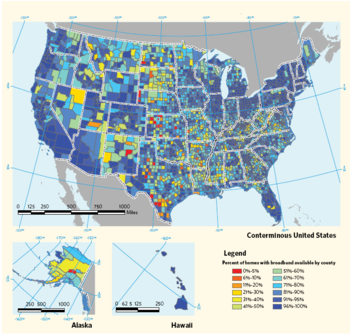
English: Availability of 4 Mbps-Capable Broadband Networks in the United States by County (Photo credit: Wikipedia)
Carl’s opinion piece is clearly in support of an industry that is very happy to sell equipment to these new customers because the incumbent telco business is not growing very fast, if at all. Allowing government to offer communications services in a particular market is not competing; it is taking it over because they can use bonds (low interest) and taxpayer money to fund these networks. State legislators have created these laws to prevent just these things from happening along with providing protection when half of these ventures go bankrupt.
Telcos are not clean on this because they are using crony capitalism to protect their monopoly or duopoly. If legislators enact such laws they should hold incumbents to the universal service agreement that AT&T adhered for decades.





